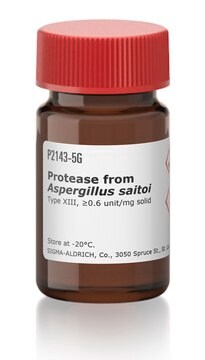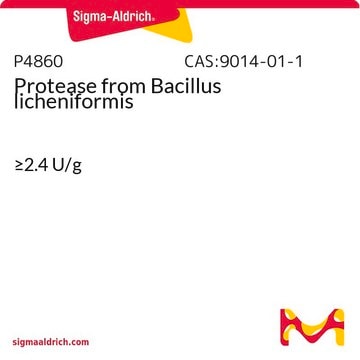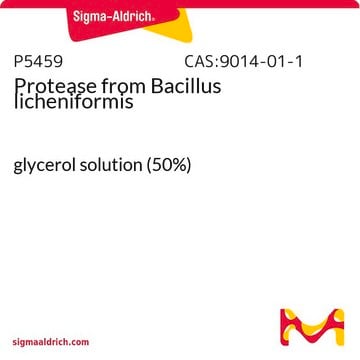Recommended Products
description
acidic protease
form
powder
specific activity
≥0.2 unit/mg solid
storage temp.
2-8°C
Looking for similar products? Visit Product Comparison Guide
General description
Exhibits both proteolytic and lipolytic activities.
Proteases are proteolytic enzymes that digests the proteins. It is classified into acidic, neutral and alkaline proteases based on their pH optimum. Proteases finds its applications in textile industries, laundry and healthcare. It is also being used in food processing industries such as baking and brewing. Rhizopus chinensis is the key species in the production of aspartate proteinase.
Stable in the acid range of pH 3-5. pH Optimum is 3.0.
Application
Protease from Rhizopus sp. has been used in the enzyme treatment of planted and nonplanted scots pine seedlings.
Protease from Rhizopus spp. Has been used in a study to assess the amino acid sequences near the amino termini using automated Edman degradation. It has also been used in a study to investigate inactivation of the enzyme by reaction with diazoacetyl-DL-norleucine methyl ester in the presence of cupric acetate.
Biochem/physiol Actions
Protease from Rhizopus chinensis can be inhibited by pepstatin.
Unit Definition
One unit will hydrolyze casein to produce color equivalent to 1.0 μmole (181 μg) of tyrosine per min at pH 3.0 at 37 °C (color by Folin-Ciocalteu reagent), unless otherwise indicated.
Physical form
Supplied as a powder containing dextrin as a stabilizer
Signal Word
Danger
Hazard Statements
Precautionary Statements
Hazard Classifications
Resp. Sens. 1
Storage Class Code
11 - Combustible Solids
WGK
WGK 1
Flash Point(F)
Not applicable
Flash Point(C)
Not applicable
Certificates of Analysis (COA)
Search for Certificates of Analysis (COA) by entering the products Lot/Batch Number. Lot and Batch Numbers can be found on a product’s label following the words ‘Lot’ or ‘Batch’.
Already Own This Product?
Find documentation for the products that you have recently purchased in the Document Library.
Customers Also Viewed
The structure and function of acid proteases. Specific inactivation of an acid protease from Rhizopus chinensis by diazoacetyl-DL-norleucine methyl ester.
F Mizobe et al.
Journal of biochemistry, 73(1), 61-68 (1973-01-01)
Characterization of proteases from Rhizopus species after growth on soybean protein
Heskamp ML and Barz W
Zeitschrift fur Naturforschung C, 52(9-10), 595-604 (1997)
The amino terminal sequences of acid proteases-human pepsin and gastricsin and the protease of Rhizopus chinensis.
P Sepulveda et al.
Biochemical and biophysical research communications, 63(4), 1106-1112 (1975-04-21)
J Marciniszyn et al.
The Journal of biological chemistry, 251(22), 7088-7094 (1976-11-25)
Four derivatives of pepstatin, each of which contains the unusual amino acid 4-amino-3-hydroxy-6-methylheptanoic acid (statine) have been prepared. All four are porcine pepsin inhibitors. Both N-acetylstatine and N-acetyl-alanyl-statine are competitive inhibitors for pepsin with Ki values of 1.2 X 10(-4)
Rice bran as a substrate for proteolytic enzyme production
Sumantha A, et al.
Brazilian Archives of Biology and Technology, 49(5), 843-851 (2006)
Our team of scientists has experience in all areas of research including Life Science, Material Science, Chemical Synthesis, Chromatography, Analytical and many others.
Contact Technical Service












